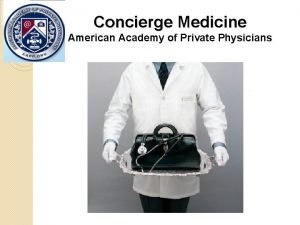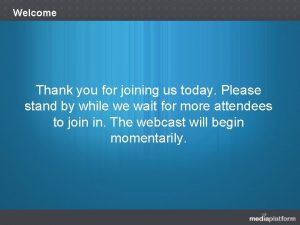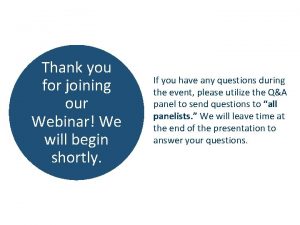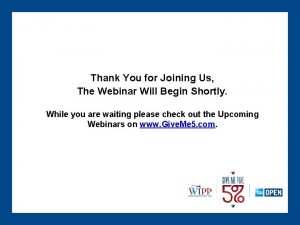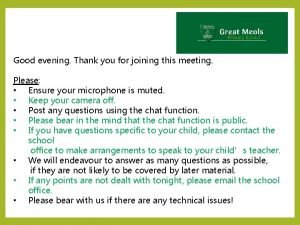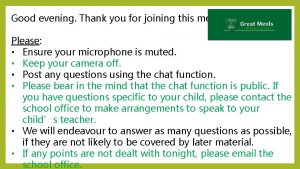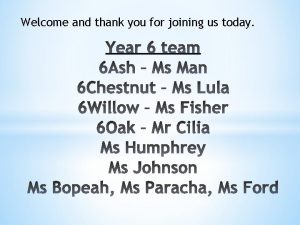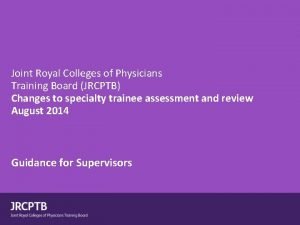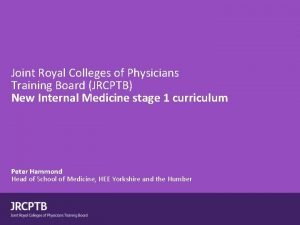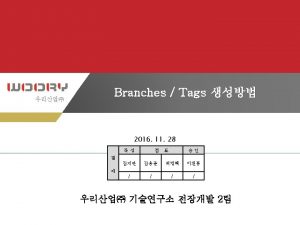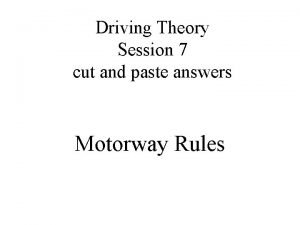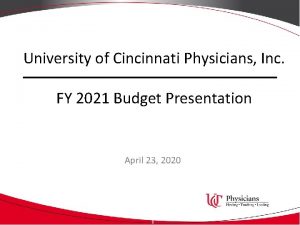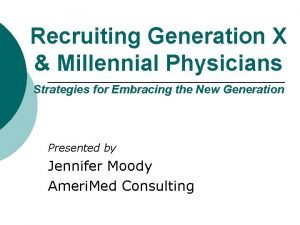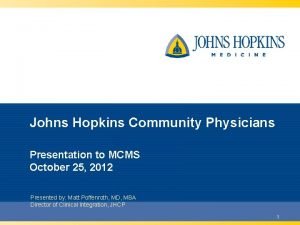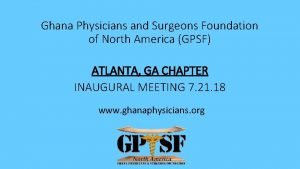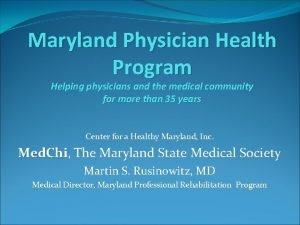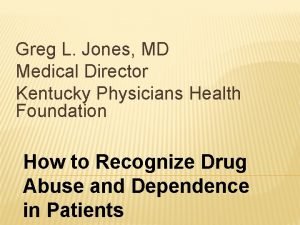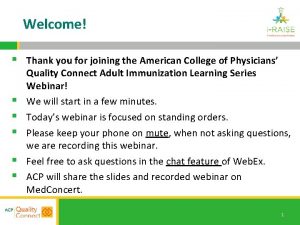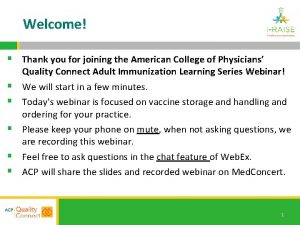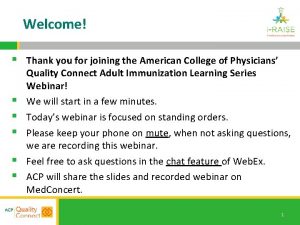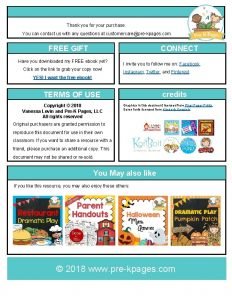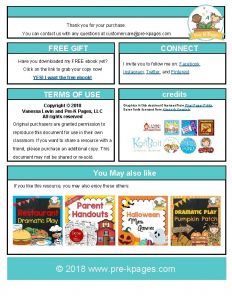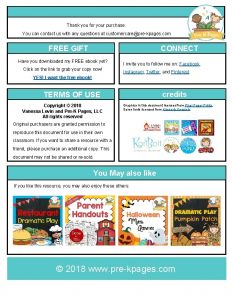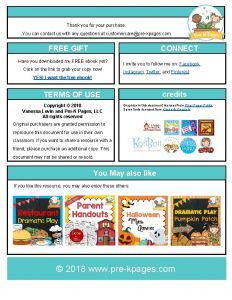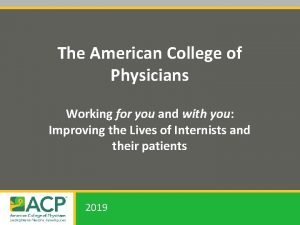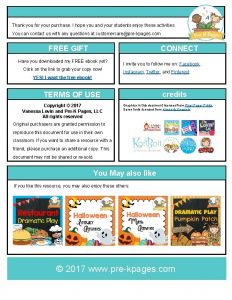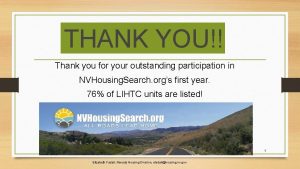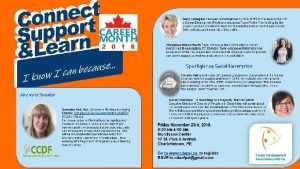American College of Physicians Thank you for joining




















- Slides: 20

American College of Physicians Thank you for joining us for today’s webinar Addressing and Supporting Physician Mental Health during Challenging Times Presented by the ACP Leadership Academy and the ACP Well-being and Professional Fulfillment program The webinar will begin promptly at 3: 00 p. m. ET A recording of this presentation will be available at acponline. org/leadershipacademy

Addressing and Supporting Physician Mental Health during Challenging Times Kerri Palamara, MD, FACP Joshua C. Morganstein, MD

CME and Disclosure Information The American College of Physicians (ACP) is accredited by the Accreditation Council for Continuing Medical Education (ACCME) to provide continuing medical education for physicians. The ACP designates this other activity (blended) for a maximum of 1 AMA PRA Category 1 Credit(s)™. Physicians should claim only the credit commensurate with the extent of their participation in the activity. To claim CME credit, please go to: https: //www. acponline. org/wellbeing-webinars-cme The individuals in control of content for this activity have nothing to disclose. 3

Disclaimer The ideas, attitudes, and opinions expressed herein are my own and do not necessarily reflect those of the Uniformed Services University, the U. S. Public Health Service, the Department of Defense, or other branches of the U. S. government. I am not endorsing any of the entities or resources mentioned in this presentation and have no relevant disclosures or conflicts of interest to report.

Shultz, J. M. , Espinola, M. , Rechkemmer, A. , & Cohen, M. A. (2016). Prevention of Disaster Impact and Outcome Cascades. In The Cambridge Handbook of International Prevention Science (pp. 492– 519).

Psychological & Behavioral Responses to Pandemics/Disaster • Distress Reactions Resilience Sleep difficulties • Decreased Sense of Safety • Physical (Somatic) Symptoms • Irritability, Anger • Distraction, Isolation Psychiatric Disorders Health Risk Behaviors Ursano, R. , Fullerton, C. , Weisaeth, L. , & Raphael, B. (2017). Individual and Community Responses to Disasters. In R. Ursano, C. Fullerton, L. Weisaeth, & B. Raphael (Eds. ), Textbook of Disaster Psychiatry (pp. 1 -26). Cambridge: Cambridge University Press. • Depression • PTSD • Anxiety • Complex Grief • Alcohol, Tobacco, Rx meds • Family Distress • Interpersonal Conflict/Violence • Disrupted Work/Life Balance • Restricted Activities/Travel

Community Phases of Disasters De. Wolfe, D. J. (2000). Training manual for mental health and human service workers in major disasters. (D. J. Nordboe, Ed. ) (2 nd ed. ). SAMHSA. Retrieved from https: //files. eric. ed. gov/fulltext/ED 459383. pdf Gladwell, M. (2000). The Tipping Point: How Little Things Can Make a Big Difference. Little Brown & Company. New York, NY.

Risk Factors for Healthcare Workers PRE • • • PRE-EVENT Socioeconomic Status Social Support Training Status Work Environment Underlying Health Conditions Help-Seeking Behaviors Morganstein, J. C. , West, J. C. , & Ursano, R. J. (2017). Work-Associated Trauma. In K. A. Brower & M. B. Riba (Eds. ), Physician mental health and well-being: research and practice (pp. 34– 60). POST DISASTER • • • EVENT Duration & Severity of Exposure Psychological Identification Illness Bereavement Moral injury Norris, F. H. , Friedman, M. J. , Watson, P. J. , Byrne, C. M. , Diaz, E. , & Kaniasty, K. (2002). 60, 000 disaster victims speak: Part I. An empirical review of the empirical literature, 1981 -2001. Psychiatry, 65(3), 207– 239. • • RECOVERY Job Loss, Financial Hardship Social support Loss Low Organizational Support Lack of Rest & Recovery Somasundaram and van de Put (2006). Management of Trauma in Special Populations after a Disaster. J Clin Psychiatry; 67(suppl 2): 64 -73

Psychological First Aid (PFA) The Five Elements: Safety Calming Self/Community Efficacy Connectedness Hope/Optimism • Analogous to “First Aid” • Population-based “framework” • “Do no harm” approach • Resilience-focused • NOT a cure/tx for illness • MAY mitigate illness/dz Hobfoll, S. E. , Watson, P. , Bell, C. C. , Bryant, R. A. , Brymer, M. J. , Friedman, M. J. , et al. (2007). Five essential elements of immediate and mid-term mass trauma intervention: empirical evidence. Psychiatry, 70(4), 283– 315– discussion 316– 69.

Resources: Education Tools CSTS COVID-19 Response page https: //www. cstsonline. org/resources/resourcemaster-list/coronavirus-and-emerging-infectiousdisease-outbreaks-response Pandemics: Health Care Emergencies (FREE from Cambridge Press) https: //www. cambridge. org/core/services/aop-cambridgecore/content/view/478824 C 480288 A 8935798 FBF 151 D 96 FA/978131648 1424 c 18_p 270 -284_CBO. pdf/pandemics_health_care_emergencies. pdf

Sustainment of Healthcare Workers ORGANIZATIONS INDIVIDUALS Self-care Take Breaks Peer (Battle) Buddy Stay Connected Do Self Check-ins Honor Service Speak Up Training Equipment Education Policies Procedures Resources Brooks, S. K. , Dunn, R. , Amlôt, R. , Rubin, G. J. , & Greenberg, N. (2018). A Systematic, Thematic Review of Social and Occupational Factors Associated With Psychological Outcomes in Healthcare Employees During an Infectious Disease Outbreak. Journal of Occupational and Environmental Medicine / American College of Occupational and Environmental Medicine, 60(3), 248– 257. LEADERS Presence Communication Encouragement Be an example Normalizing Hope/optimism Grief Birkeland, M. S. , Nielsen, M. B. , Knardahl, S. , & Heir, T. (2015). Timelagged relationships between leadership behaviors and psychological distress after a workplace terrorist attack. International Archives of Occupational and Environmental Health. Wood, M. D. , Walker, T. , Adler, A. B. , Science, C. C. O. H. , & Jahangiri, K. (2020). Post. Traumatic Growth Leadership: Mitigating Stress in a High-Risk Occupational Health Science.

SAFETY HOPE Restore Normal Activities Encourage Problem-Solving Leverage Opportunities Focus on Strength/Growth EFFICACY Training Equipment Information Protect Family ”Buddy Up” HCW-derived Activities Recognize Service Helping Resources Buddy Checks CALMING Ensure Sleep & Meals Use Media Wisely Provide Information Normalize Reactions Breaks, Rest Cycles Listen to People CONNECTEDNESS Team Huddles Buddy Checks Camaraderie Activities Technology

“Buddy Up” • Buddy systems (swim buddy, high risk work “buddy checks”, 12 -step pgms) • Safety, social support, efficacy • Formal (vs ad hoc) peer support • Collaborative selection process • Daily check-ins: self-care, emotional health, camaraderie Ramsberger, P. F. , Mills, L. , & Legree, P. (2002). Evaluation of the Buddy Team Assignment Program (p. 60). United States Army Research Institute for the Behavioral and Social Sciences.



Questions? 16

Additional Resources American College of Physicians

Additional Resources • COVID-19 ACP Physician's Guide Clinician Well-being Resources • Features resources dedicated to personal resilience, crisis lines and counseling support, institutional and team well-being, grief management, and more • CME-eligible ACP Well-being webinars • COVID-19: Practical Support from Internists on the Front Lines • Mini But Mighty Skills for Well-being • Positive Psychology in Times of Crisis • COVID-19 Administrative and Regulatory Relief Advocacy • Advocating for administrative and regulatory relief to remove unnecessary burden on physicians so they are able to focus their efforts on addressing the COVID-19 crisis • Asking HHS to make a targeted allocation from the Provider Relief fund to primary care physicians and other clinicians to help them weather the COVID 19 pandemic and help remove financial strains on primary care practices • Created a Chapter Advocacy Toolkit that features resources and calls to action that ACP chapters can use to advance policies at the state level Please contact acpwellbeing@acponline. org for any questions, comments, or suggestions

Additional Resources Visit ACP’s COVID-19 Resource Hub: www. acponline. org/covid 19 Register for Upcoming Programming: Innovations in the Care of Outpatients with COVID-19 Wednesday, June 24, 2020 5: 00 p. m. - 6: 00 p. m. ET www. acponline. org/leadershipacademy

Thank you! 20
 American college of private physicians
American college of private physicians Welcome thank you for joining us
Welcome thank you for joining us Welcome and thank you for joining us
Welcome and thank you for joining us Thank you for joining our webinar
Thank you for joining our webinar Thank you for joining the webinar
Thank you for joining the webinar Thank you for joining us, good evening
Thank you for joining us, good evening Thank you for joining us, good evening
Thank you for joining us, good evening Thank you for joining us today
Thank you for joining us today Jrcptb msf
Jrcptb msf Group 2 specialties
Group 2 specialties Listening to me
Listening to me Thank you for your nail pierced hands
Thank you for your nail pierced hands Thank you lord you died for me
Thank you lord you died for me Thank you any question
Thank you any question Colour of reflective studs between motorway and slip road
Colour of reflective studs between motorway and slip road University of cincinnati physicians inc
University of cincinnati physicians inc Retaining millennial physicians
Retaining millennial physicians Jhu community physicians
Jhu community physicians Ghana physicians and surgeons foundation
Ghana physicians and surgeons foundation Maryland physician health program
Maryland physician health program Kentucky physicians health foundation
Kentucky physicians health foundation
